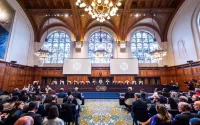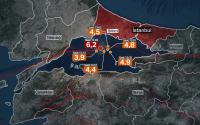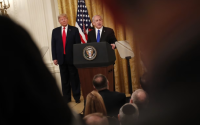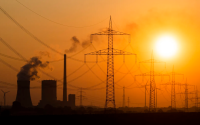Published on Monday, December 23, 2002 by the San Francisco Chronicleby Robert Collier
A candle clutched in one hand, Elizabeth Boardman is bundled up in a chill desert wind, standing outside the Al-Taji power-generating plant 15 miles from downtown Baghdad.
The plant was destroyed by U.S. bombs in the 1991 Gulf War, and if war comes again, as seems increasingly likely, American missiles may once again reduce the plant to rubble. Elizabeth Boardman, 61, is here to "bear witness," doing her part, however small, and possibly in vain, to try to stop it.
"Saddam Hussein doesn't know me, and I'm not here to support him," says Boardman, one of several dozen foreign peace activists conducting a vigil in the cold Iraq night air. "I'm here to stand with the Iraqi people, who are suffering from U.S. policies that I think are completely wrong."
With war perhaps just weeks away, activists such as Boardman have been coming to Iraq, and some say they will stay even if the bombs start to fall and American soldiers fight their way through the streets of Baghdad. They are here, they insist, not to support the regime of Saddam Hussein -- "He's an evil man," says Boardman -- but to remind the world of the damage a war can bring.
Their presence angers critics who regard activists like Boardman as propaganda dupes of a totalitarian regime.
When actor and Marin County resident Sean Penn visited Baghdad last week, he was labeled by some as a latter-day "Hanoi Jane," a reference to actress Jane Fonda's notorious visit to North Vietnam during the Vietnam War. Further ammunition for such criticisms came when the Iraqi government claimed that Penn agreed with its contention that the regime possessed no weapons of mass destruction, an assertion angrily denied by Penn.
Boardman insists she is not driven by politics or ideology. The executive director of the North and South Market Adult Day Health Center, a San Francisco nonprofit that provides medical care for senior citizens, Boardman describes herself as a "hard-core Quaker pacifist."
FAMILY TRADITION
The daughter of a World War II conscientious objector, she protested U.S. intervention in Central America in the 1980s by withholding her federal income taxes. Now, with a war in Iraq seeming closer, she decided that Baghdad was the place to be.
"My daughter said, 'Oh, Mom, you would do this,' and a lot of other friends and family worry about me here. And I was petrified for a while after I made the decision to come," she says. "But I just remind people now of the Iraqi civilians and U.S. soldiers who will be in real danger. They're the ones to worry about."
Standing alongside Boardman outside the Al-Taji power plant are Catholics, Mennonites, Jews and Buddhists, prompted to come here, they say, by deeply held religious beliefs.
"The principal thing for me, for my soul, is to identify with the victims," says Charles Liteky, a former Army chaplain who says he plans to stay if war comes. A San Francisco resident whose long career as an anti-war activist has earned him two stints in federal prison, Liteky spends most of his days here at a local orphanage run by Catholic nuns, helping children with cerebral palsy to eat and play.
"I may be able to save a child in the orphanage during the bombing, or administer first aid to somebody in the neighborhood with the skills I learned in Vietnam," says the 71-year-old Liteky, who was awarded the Congressional Medal of Honor in 1968 when he carried 22 wounded soldiers to safety during heavy combat in Vietnam.
Asked whether he would do the same for a wounded American soldier fighting in Baghdad, Liteky responds, "Of course I'd go get him, no matter whether he was an American soldier or an Iraqi soldier. They're all human beings."
VOICES IN THE WILDERNESS
Liteky, Boardman and other activists are members of an organization called Voices in the Wilderness, whose headquarters is in Chicago. The anti-war group has brought dozens of American delegations to Iraq since 1996 to protest U.S. policies toward Iraq and U.N. sanctions, in effect since the 1991 Gulf War, saying they have unfairly affected Iraq's civilian population.
After Voices in the Wilderness was fined $20,000 by the Treasury Department for violating the U.S. ban on travel to Iraq, members of the group traveled to Washington earlier this month to deliver payment -- in virtually worthless Iraqi dinars.
Kathy Kelly, co-founder of Voices in the Wilderness, acknowledges that her organization's credibility was tarred last September when it staged a demonstration outside U.N. headquarters in Baghdad. Critics point out that demonstrations except those staged by the government are usually banned.
It was "a disaster," she said. "We're here to protest the fact that U.N. sanctions and U.S. bombs have killed hundreds of thousands of children in the past decade, but we get saddled somehow with being dupes."
Many of the activists seemed aware of the contradictions of protesting against U.S. policies in a country where free speech is sharply curtailed.
"If I got up in a church service here and yelled, 'Down with Saddam,' I'd be tossed out of here, I wouldn't last 24 hours," admits the Rev. Roy Bourgeois, a Catholic Maryknoll priest and longtime anti-war activist who just ended a two-week visit with other religious activists, during which they held a service at a local Chaldean Catholic church and read a statement opposing a U.S. war. "There's control here that I've never seen."
Many of the visiting Americans say that whatever their misgivings about the political situation, they have been surprised by the warmth and hospitality of everyday Iraqis they have met.
"I expected people here to be very angry at Americans, but I've found that they make distinctions between the American people and our government, which is a lot more than our government does in return," said Sister Simone Campbell, a Catholic nun who is a Sacramento lobbyist for Jericho, an interfaith social- services coalition. "I met a mother who can't get chemotherapy for her young boy with cancer because the medicines are viewed as 'dual use,' " referring to materials that the United Nations says could be used for chemical or biological weapons. "It broke my heart. But she was very sweet. She wasn't angry at me."
WHEN THE SHOOTING STARTS
But even those who say they are willing to stay even if war comes know there may be little they can do once the shooting starts.
"We couldn't stop a bomb with our bodies, and we can't stop the war," said Kelly.
Nevertheless, for Boardman, who plans to return to the Bay Area early next month, her visit to Iraq has been more than a quixotic gesture. In addition to resuming her day job, she says, she will be undertaking a hectic round of speaking engagements.
"I hope that my experience here can help invigorate people back home who may think war is inevitable and are losing hope," she says.






